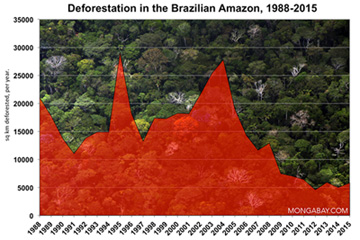Anti-NGO rhetoric in Brazil a response to environmental criticism says environment minister
mongabay.com
October 8, 2008
|
|
Accusations against foreign environmental groups operating in the Brazilian Amazon are “exaggerated” to deflect criticism on high deforestation rates in the region said Brazil’s environment minister at a summit in Brasilia.
Speaking Tuesday at the Reuters Global Environment Summit, Carlos Minc said that members of Congress and the military are overplaying the role of foreigners in Amazon deforestation as well as their threat to national sovereignty.
“I think these accusations are being exaggerated. There are a few companies and NGOs linked to biopiracy. But they are the overwhelming minority,” Reuters quoted him as saying. “Today the Amazon unfortunately is destroyed mostly by Brazilians.”
“Often the big loggers accuse NGOs like Greenpeace or WWF because they’re not happy with criticism against themselves,” he continued, adding that falling commodities and the global economic slowdown would likely reduce the pressure to clear Amazon forests.
|
|
Minc’s comments come six months after the Brazilian Congress proposed measures to force foreigners — including tourists — to register with the military before visiting the Amazon.
Brazil’s sensitivity over the Amazon and “biopiracy” are not new. In the late 1950s, following the internationalization of Antarctica, Brazil became concerned over its tenuous claim to the Amazon and began taking steps to assert control over the region. To establish a “presence” in the Amazon, and therefore the right to keep it as part of the national territory, the Brazilian government set up the Manaus Free Trade Zone — a sort of tariff-free manufacturing zone — and aggressively promoted settlement and development in the Amazon, resulting in widespread forest loss, especially in the 1970s and 1980s. Today Brazil frequently asserts its rights to develop the Amazon as it pleases. Congress has launched several investigations into alleged “biopiracy” by researchers in the Amazon but these have failed to turn up any evidence of wrong doing. Conspiracy theories aside, some researchers believe the investigations are merely a guise by development interests to stifle criticism and oppose conservation efforts in Earth’s biggest rainforest.
“Brazil has lost all kinds of money and intellectual importance because of its attempts to protect biodiversity from international interference,” Brazilian researcher Philip Fearnside of INPA told Nature, following a flap over the jailing of Dr. Marc Van Roosmalen, a prominent Brazilian primatologist and conservationist, last year. Van Roosmalen was later freed after international condemnation of the arrest and a call for strikes and civil disobedience by Brazilian scientists.
“Van Roosmalen is a specific case, within a broader context that is very sad for the country,” Leandro Salles of the National Museum in Rio de Janeiro was quoted as saying by Nature in the aftermath of the arrest. “Under the current laws, researchers are treated as potential criminals.”
Dr. Roberto Cavalcanti, a zoology professor at the University of Brasilia, told The Associated Press in 2005 that the “biopiracy concept ‘has been hijacked’ by opponents of measures to protect the rain forest against commercial overexploitation.”
